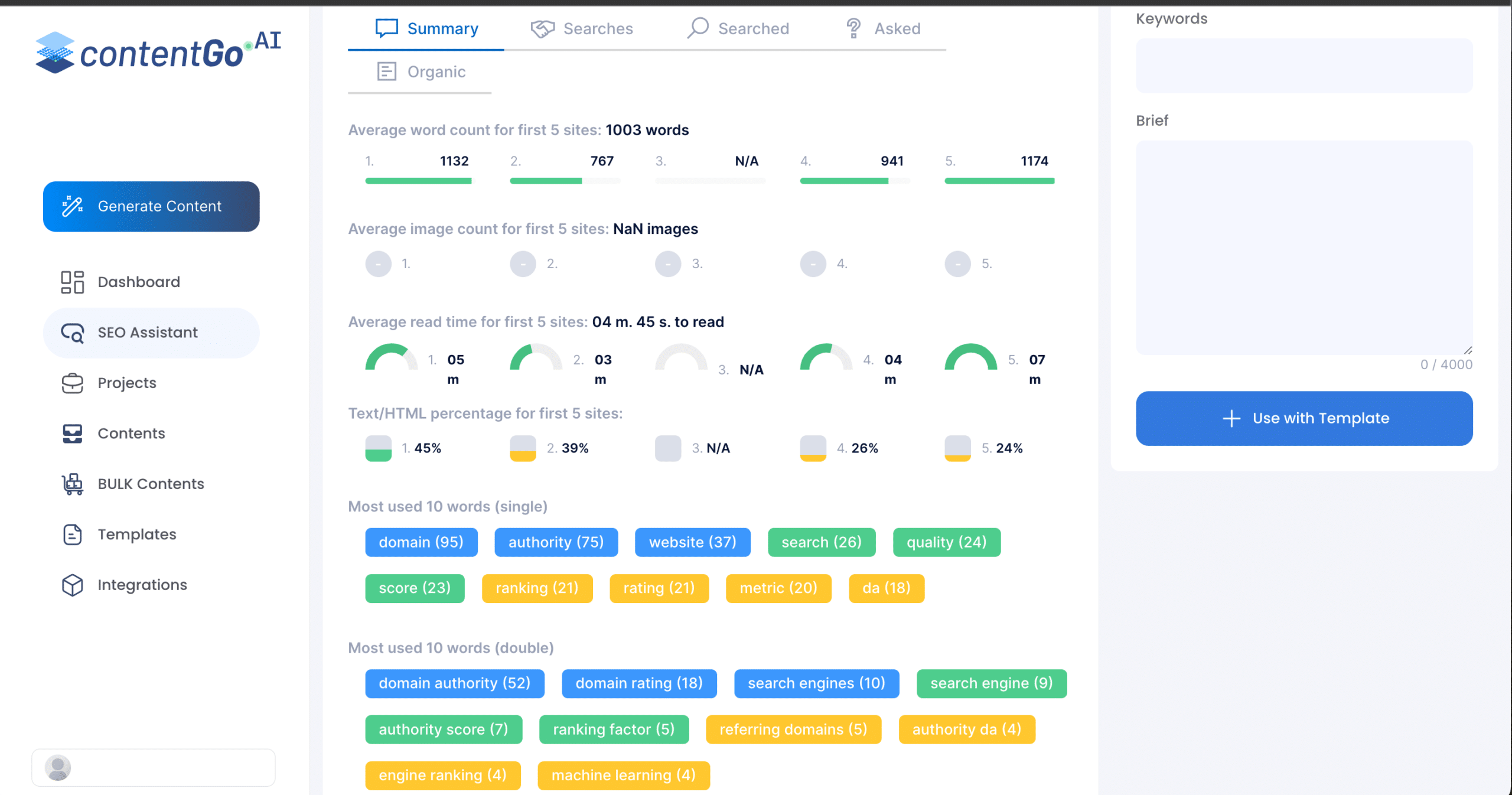SERP analysis isn’t just about seeing who ranks where; it’s about comprehending the whys and the hows behind the rankings. It lets you peek behind the curtain to see top competitors’ tactics to secure their spot on search engines.
For a successful analysis, knowing what to look for and how to interpret data is crucial, as is selecting the right SERP analysis tool for the job.
Why is SERP Analysis important in SEO?
SERP analysis is a vital component of Search Engine Optimization (SEO). It’s not just about your website’s ranking but also about understanding the features the search engine prioritizes for these keywords, such as snippets, local packs, or image carousels.
Examining the SERPs introduces you to the world that your potential visitors navigate through and sheds light on how other sites succeed in engaging them. Recognizing the winning attributes in these competing pages can inspire tweaks and enhancements in your SEO strategy.
Conducting a thorough SERP analysis helps identify what your competitors are getting right and provides opportunities for you to incorporate similar tactics. Remember, the key isn’t about copying but adapting strategies proven to work within your unique digital marketing plan.
Another benefit is the ability to uncover new keyword opportunities. Sometimes, your analysis might lead to long-tail keywords that are less competitive but can draw in a more targeted audience. This can be a turning point for smaller websites trying to carve out a space for themselves among established players.
A detailed SERP analysis also bears the user intent behind different search queries. By understanding what searchers are looking for, you can fine-tune your content to meet those needs more precisely, increasing the likelihood of improving your rank on the SERP.
Lastly, this process helps you estimate the difficulty of ranking for specific keywords. You learn which ones will require more robust content or a greater number of backlinks, helping prioritize efforts and allocate resources for maximum SEO impact.

Key Elements to Focus on During SERP Analysis
When you’re performing a SERP analysis, there are several key elements you should pay careful attention to. The type of content ranking (such as blog posts, product pages, or videos) tells a story about what Google believes is the most relevant format for answering queries related to your target keywords.
Next, look at the headlines used by the top results. These are typically crafted to catch both the search engine’s algorithm and the searcher’s attention. Analyzing these can give you insights on how to frame your titles for maximum impact.
Another aspect worth noting is the presence of featured snippets, “People also ask” boxes or other SERP features. Are these dominated by a certain type of content or site? If so, aligning your content strategy to target these features could be beneficial.
Examine the backlink profiles of the top-ranking pages as well. The quality and quantity of backlinks are strong indicators of the domain authority and trustworthiness of these sites in the eyes of the search engine. Tools that aid in backlink analysis can be extremely helpful here.
Also, consider the user experience on these sites. Is the content well-organized, skimmable, and easy to read? User experience metrics are ranking factors, so ensure your site stands up well by comparison in these areas.
Lastly, check if the high-ranking pages are from high-authority domains or if there’s room for new players. Understanding the level of competition is essential in gauging how hard you need to work to move up in the ranks.
Finding the Best SERP Analysis Tool
The landscape of SEO is peppered with an array of SERP analysis tools, each promising to offer the insights you need to outpace your competition. Deciphering which tool is the best for your specific needs is pivotal. The best tool is intuitive and aligns with your SEO strategy and goals.
It’s all about accuracy and up-to-date data regarding SERP analysis. The best SERP analysis tool can provide real-time data, pulling the latest information directly from the search engines to ensure that your analysis is always relevant.
Your chosen tool should also support comprehensive keyword research and competitor analysis features. The ability to track keyword rankings over time and study your competitors’ domain strength can make or break your SEO efforts.
Here is some of the SERP analysis tools that you can test
SE Ranking: Known for its affordability and ease of use, SE Ranking tracks major search engines like Google, Bing, Yandex, and YouTube. It offers customizable keyword tracking frequency and a user-friendly dashboard for beginners in SEO.
AccuRanker: This tool targets experienced SEOs and agencies managing multiple websites. It stands out for offering on-demand SERP analysis and daily keyword ranking updates. AccuRanker is recognized for its advanced reporting features and integration capabilities with other tools like Google Data Studio and Analytics.
Ahrefs: A comprehensive SEO tool used for keyword research and link building. It provides an organized interface for SERP analysis, but its keyword tracker updates every 5-7 days, which may be slow for some users. Ahrefs is ideal for an all-in-one SEO tool with moderate keyword rank-tracking capabilities.
Serpwatch: This tool is particularly suitable for agencies, offering features like SERP analysis, rank tracking, keyword analysis, and extensive report generation. It allows hourly updates for rankings and is relatively affordable compared to other tools.
Serpstat: An all-in-one SEO suite that offers advanced web ranking data for multiple search engines and keyword and competitor research. Serpstat provides real-time analysis and is praised for its comprehensive data at an affordable price point.
ContentGo AI: SERP tool from Contentgo Ai is designed to provide
- Detailed analysis of competitors
- Top 5 SERP results for the target keyword
- Average word count of top content
- People Also ask
- Image count
- Text/HTML percentage
With Contentgo AI is not only you can do your keyword research, but you can also create high-quality humanlike AI content.

Practical Steps for Conducting SERP Analysis
To carry out a productive SERP analysis, start by identifying a list of your main keywords. Then, use your SERP analysis tool to survey the current landscape of each keyword’s results page. Notice the commonalities among the top-ranking websites—what are they doing that your site isn’t?
Pore over the title tags and meta descriptions of your competitors’ sites. These elements are critical for rankings and can provide clues about their target keywords. Are they using specific phrases or questions? Could refining your tags give search engines and searchers a clearer picture?
Analyze the content structure and format across the top-ranking pages. Look at their headings, lists, images, and other media use. The organization of information can hold the key to how easily the content satisfies user queries, suggesting improvements for your site.
Don’t underestimate the power of loading times and mobile optimization. With Google’s mobile-first indexing, a seamless mobile experience can influence your rankings. Check the top pages on various devices to ensure you’re not missing out on this critical aspect.
Work on identifying gaps. Maybe your competitors have overlooked a particular angle or piece of information. Filling these gaps with high-quality, relevant content could propel your rankings further.
Finally, make sure to do this analysis regularly. Search engines constantly refine their algorithms, which can shift the competitive landscape quickly. A periodic check helps you stay in tune with your target audience’s current trends and demands.
How SERP Analysis Strengthens Your Content Strategy
A thorough SERP analysis translates into a more robust content strategy. It helps you understand which topics and keywords are worth targeting and the type of content you should create. Your strategy then aligns more closely with the intent behind user searches, which is pivotal in attracting organic traffic.
Implementing the lessons learned from SERP analysis can elevate the quality of your content. It will be more informative, better structured, and provide a richer user experience – all key ingredients in the recipe for SEO success. Prioritizing content that the search engines favor can increase visibility and engagement.
Content length and depth also play a significant role. Analyzing the top-ranking pages often reveals that comprehensive, in-depth content tends to perform better.
Integrating multimedia elements such as images, videos, and infographics, as informed by your SERP analysis, can make your content more engaging and shareable. This enhances user experience and increases the likelihood of earning backlinks, further boosting your SEO efforts.
Monitoring the SERPs also alerts you to emerging trends and changes in your industry. You can be one of the first to create content around these new topics, establishing your site as a thought leader and go-to source for information.
Remember that consistency is key. Regularly updating your content to reflect the latest SERP analysis ensures that your strategy remains effective and your content fresh and relevant. It also signals to search engines that your site is well-maintained and authoritative.
Leveraging SERP Analysis to Outrank Competitors
The ultimate aim of SERP analysis is to outsmart and outrank your competitors. To achieve this, looking beyond the surface and digging into the data is imperative. Your findings should influence your ongoing SEO activities and decision-making process at every level.
Always consider the competitive landscape when creating or updating content. Knowing the strengths and weaknesses of your competitors’ strategies enables you to craft a more compelling and unique value proposition for your audience. This can set you apart and position you higher in the SERP rankings.
One aspect of outranking competitors is the effective use of keywords. While targeting high-volume keywords is important, don’t overlook the potential of niche, long-tail keywords revealed during your SERP analysis. These can be goldmines for attracting a dedicated audience.
Social signals are another territory to conquer. Assessing how well your competitors engage their audience on social media can inform your social strategy, potentially enhancing your social presence and SERP standing.
Ultimately, successful SERP analysis requires regular revisiting. The digital landscape is constantly changing, with new competitors and algorithm updates. Staying on top of these changes with proactive SERP analysis will keep your strategy agile and responsive, helping maintain and improve your SERP positions.
Final Thoughts on Mastering SERP Analysis
SERP analysis is an indispensable part of any SEO strategy. It provides the blueprint for what to strategize, optimize, and prioritize in your endeavor to climb the search engine ranks. This task becomes more manageable and informative with the right SERP analysis tool.
Remember that analyzing SERPs is an ongoing process. The search landscape is highly dynamic, with updates rolling out frequently. Consistently using SERP analysis to inform your strategy ensures you stay ahead of the curve, adapting to the evolving demands of both search engines and searchers.
Crafting content that aligns with the best practices unearthed from your SERP analysis is, without a doubt, the best way to analyze SERP competitors and stay ahead in the game. It’s about learning from others and infusing your innovation and unique selling propositions into your SEO efforts.
Championing SERP analysis is not just about achieving high rankings; it’s about maintaining them. Your strategy should never be static; it should pulsate with the rhythm of regular analysis and adaptation. This approach distinguishes you from your competition and builds a sustainable online presence.
As you incorporate these techniques and insights into your daily SEO routine, the pathway to digital success becomes clearer. With persistent effort, patience, and the right analytical tools, your site can rise to the top of the SERPs, where the view (and the traffic) can be spectacular.
Embarking on a journey of SERP analysis with a strategic mindset can transform the fortunes of your website. Harness the power of detailed analysis, continuous learning, and a keen eye for SEO opportunities to elevate your online visibility and achieve your digital marketing objectives.












